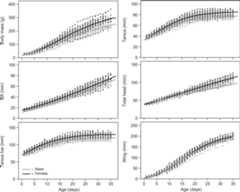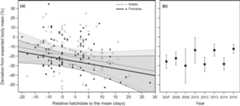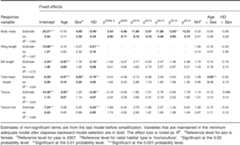DOI:10.1111/IBI.12541 - Corpus ID: 90880117
Sex‐specific growth in chicks of the sexually dimorphic Black‐tailed Godwit
@article{Loonstra2018SexspecificGI, title={Sex‐specific growth in chicks of the sexually dimorphic Black‐tailed Godwit}, author={A. H. Jelle Loonstra and Mo A. Verhoeven and Theunis Piersma}, journal={Ibis}, year={2018}, volume={160}, pages={89-100}, url={https://api.semanticscholar.org/CorpusID:90880117}}- A. J. LoonstraM. VerhoevenT. Piersma
- Published2018
- Biology, Environmental Science
- Ibis
It is argued that in estimating growth curves for sexually dimorphic species, it is critical first to make accurate sex and age determinations, as conditions are limiting in the current agricultural landscape.
27 Citations
27 Citations
Sex-specific growth and morphometric sexing of chicks of the Black-headed Gull (Chroicocephalus ridibundus)
This work developed a discriminant function that allowed to correctly predict the sex of 88.5% of Black-headed Gull chicks before fledging, and examined growth patterns of 80 males and 76 females from hatching to departure from breeding colonies during three seasons.
Sex-specific growth of nestlings of the Whiskered Tern Chlidonias hybrida, a species with sexual size dimorphism and female brood desertion
- A. BanachG. NeubauerA. FlisMateusz Ledwoń
- 2021
Biology, Environmental Science
Journal of Ornithology
The occurrence of SSD during the nestling period and higher maximum growth rate of body mass in males indicates that the costs of raising sons may be higher than of raising daughters, but there did not find evidence of either sex-biased nestling mortality or skewed sex ratio.
Natal habitat and sex-specific survival rates result in a male-biased adult sex ratio
- A. J. LoonstraM. VerhoevenR. Kentie
- 2019
Biology, Environmental Science
Abstract The adult sex ratio (ASR) is a crucial component of the ecological and evolutionary forces shaping the dynamics of a population. Although in many declining populations ASRs have been…
Sex-specific nestling growth in an obligate brood parasite: Common Cuckoo males grow larger than females
- M. PožgayováRadka PiálkováM. HonzaP. Procházka
- 2018
Biology, Environmental Science
It is found that both sexes exhibited similar mass after hatching and grew at a similar rate, which implies that male Common Cuckoo nestlings may have higher needs than female nestlings; however, this still awaits proper testing.
Sex and morph variation in activity from early ontogeny to maturity in ruffs (Calidris pugnax)
The results indicate that in species where much of the known behavioural variation is linked to mating tactics, a non-reproductive behaviour can show between-individual variation and clear sex differences, whereas morph differences appear less pronounced.
Size, shape and sex differences in three subspecies of Black-tailed Godwits Limosa limosa
- Bingrun ZhuC. HassellT. Piersma
- 2020
Biology
In all three subspecies of Black-tailed Godwits, females are larger than males and the fact that subspecies differed in the degree of size dimorphism and slightly in shape hints at sex-related differences in the ecological selection pressures between the different flyways.
Variation in Egg Size of Black-Tailed Godwits
- M. VerhoevenA. J. LoonstraT. Piersma
- 2020
Biology, Environmental Science
In Black-tailed Godwits, lay date may actually reflect a female's endogenous and/or exogenous condition at the moment of egg-laying, and this finding may be general across birds, since food supplementation experiments usually result in advanced laying and larger clutch sizes rather than in larger eggs.
Growth Curves of Ryukyu Scops Owl Nestlings, an Owl Species with Asynchronous Hatching and Reversed Sexual Dimorphism
- A. SawadaKana AkataniM. Takagi
- 2021
Biology, Environmental Science
Growth curves of Ryukyu Scops Owl nestlings, an owl species with asynchronous hatching and reversed sexual dimorphism, show that a relative power balance is found between sibling rivalry and food abundance.
Comparative analysis of weight in male and female sihek (Todiramphus cinnamominus) chicks at Brookfield Zoo Chicago
- Margaret RamontCody HickmanTim SnyderS. ChinnaduraiLance J. Miller
- 2025
Biology, Environmental Science
It is confirmed that the sihek (Guam kingfisher, Todiramphus cinnamominus) exhibits moderate reverse SSD, and the growth patterns of male and female sihek chicks are assessed using logistic nonlinear mixed models and the null model was a better fit (lower AIC).
75 References
Sex ratio, sex‐specific chick mortality and sexual size dimorphism in birds
- M. BenitoJacob González-Solís
- 2007
Biology
There was a significant inverse relationship between the degree of SSD and the proportion of males at hatching and fledging and sex‐specific mortality related to SSD showed a weak but persistent negative tendency, suggesting a mortality bias towards the larger sex.
Experimentally manipulated brood sex ratios: growth and survival in the black-headed gull (Larus ridibundus), a sexually dimorphic species
- W. MüllerE. KalmbachC. EisingT. GroothuisC. Dijkstra
- 2005
Biology, Environmental Science
Data show that, although male growth is more sensitive to a decrease in egg quality, the higher mortality of last hatched chicks in natural nests is mainly due to hatching asynchrony and egg size but not egg content, underlines the role of a higher food demand in biased mortality of the larger sex.
Variation in the magnitude of sexual size dimorphism in nestling Coal Tits (Periparus ater)
- V. Dietrich-BischoffTim SchmollW. WinkelT. Lubjuhn
- 2008
Biology, Environmental Science
Journal of Ornithology
Results are in accordance with the idea of an increased environmental sensitivity of the larger males, but confounding effects of sex-differential hatching order cannot be ruled out.
THE EVOLUTION OF SEXUAL SIZE DIMORPHISM IN THE HOUSE FINCH. III. DEVELOPMENTAL BASIS
- A. BadyaevL. A. WhittinghamG. Hill
- 2001
Biology
Evolution; international journal of organic…
It is suggested that previously documented fast and extensive divergence of house finch populations in sexual size dimorphism may be partially produced by distinct environmental conditions during growth in these populations.
THE EVOLUTION OF SEXUAL SIZE DIMORPHISM IN THE HOUSE FINCH. IV. POPULATION DIVERGENCE IN ONTOGENY
- A. BadyaevG. HillL. A. Whittingham
- 2001
Biology
Evolution; international journal of organic…
It is suggested that sex-specific expression of phenotypic and genetic variation throughout the ontogeny of house finches can result in different responses to selection between males and females of the same age, and thus produce fast population divergence in the sexual size dimorphism.
The Ontogeny of Sexual Size Dimorphism of a Moth: When Do Males and Females Grow Apart?
- R. StillwellAndrew DawsG. Davidowitz
- 2014
Biology, Environmental Science
It is concluded that the development of sexual size dimorphism in M. sexta occurs during larval development and continues to accumulate during the pupal/adult stages, and that environmental variables such as diet quality can influence patterns of dimorphisms in adults.
The growth dynamics of sexually dimorphic birds and Fisher's sex ratio theory : does sex-specific growth contribute to balanced sex ratios?
- H. Richner
- 1991
Biology
It is shown here that the arguments used in support of the hypothesis that sex-specific growth equalizes the costs of males and females are invalid, and that some of the proposed mechanisms actually increase the cost difference between the sexes.
GROWING APART TOGETHER: THE DEVELOPMENT OF CONTRASTING SEXUAL SIZE DIMORPHISMS IN SYMPATRIC SCELOPORUS LIZARDS
- R. M. CoxH. John-Alder
- 2007
Biology
Using mark-recapture data, it is shown that (1) sex differences in survival and migration cannot account for SSD, and (2) both nonlinear growth models and age-specific linear growth rates identify sexually dimorphic growth as the cause of SSD in each species.
Sexual Dimorphism in Plumage and Size in Black-Tailed Godwits Limosa Limosa Limosa
- J. SchroederP. LourençoM. VeldeJ. HooijmeijerC. BothT. Piersma
- 2008
Biology, Environmental Science
Black-tailed Godwits are sexually dimorphic mostly with respect to the amount of white spots on the neck, females being of lighter colour than males, and a greater overlap in bill length between the sexes than expected.
Ontogenetic mechanisms underlying sexual size dimorphism in Urodele amphibians: An across-species approach
- Lixia ZhangXin Lu
- 2013
Biology
It is concluded that extended longevities in one sex, which is mediated by delayed maturation, would allow it to grow for longer and get larger, with growth rate making a weak contribution to body size.
...
Related Papers
Showing 1 through 3 of 0 Related Papers






